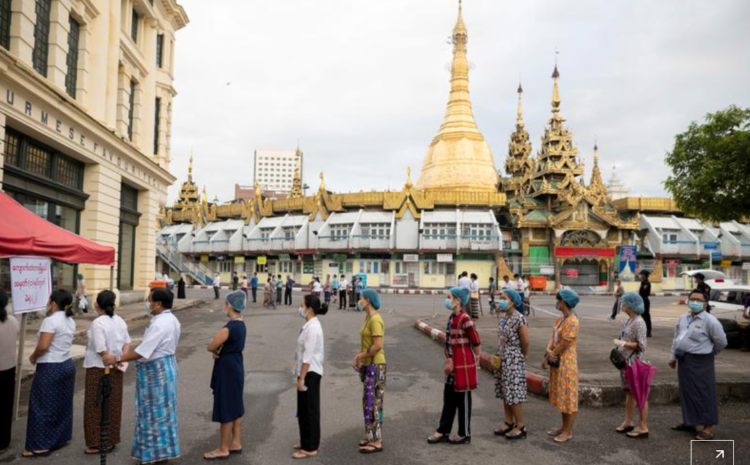YANGON (Reuters) – Myanmar voted in a general election on Sunday seen as a referendum on a fledgling democratic government that remains popular at home but which has seen its reputation collapse overseas amid allegations of genocide.
Leader Aung San Suu Kyi’s National League for Democracy (NLD) is expected to win a second term, following a 2015 landslide that ended more than a half-century of military and military-backed rule.
She has the support of a population that largely sees her as a heroine of democracy for her struggle against dictatorship, though her win will likely be narrower than the victory that propelled her to power.
More than 37 million people are registered to vote, but fears about COVID-19 may dampen turnout, with Myanmar seeing a average of 1,100 new daily coronavirus cases compared to a handful in early August.
In the biggest city, Yangon, queues formed before polling stations opened, with voters in masks, hair coverings and face shields waiting in evenly spaced lines as the sun came up.
Sai Kyaw Latt Phyo, 31, said it was his first trip outside his home in three months.
,” he said. “We must take the risk in such a crucial situation for our country.”
Chaw Ei Twin, 38, said she was doing her civic duty.
“I gave my vote to a party which can transform the country. I voted the same party last time,” she said.
GRADUAL PROGRESS
Suu Kyi’s defenders say critics are unrealistic to expect rapid change in Myanmar and are hampering efforts to secure gradual progress.
Among the obstacles to some NLD reforms is a constitution that guarantees the military a significant political stake, including control of several key ministries and a 25% quota of legislative seats, allowing it to veto constitutional amendments.
Suu Kyi and the army have historically been at odds but tensions have been running high lately, with military chief Min Aung Hlaing in a rare interview criticising “unacceptable mistakes” in the lead-up to the polls, which the government said risked creating fear and unrest.
Casting his vote in the capital Naypyitaw, Min Aung Hlaing said he backed the party that “can work hand in hand” with the military “to create a better future”.
“I have to accept the result that comes from the people’s wishes,” he said, when asked if the military would respect the outcome.
“It is necessary to act with the consideration of how to comfort the worries of the citizens … That is a must.”
The election commission has said it will try to ensure polls were free and fair, but more than a million people will be unable to vote after polls were cancelled due to insurgencies.
They join hundreds of thousands of Rohingya, a persecuted Muslim minority confined to camps and villages inside Myanmar’s Rakhine state, most without citizenship.
United Nations Secretary General Antonio Guterres on Friday urged “peaceful, orderly and credible elections” that could enable hundreds of thousands of Rohingya who fled to neighbouring Bangladesh during a 2017 army crackdown to return “in safety and dignity”.
The UN has said there was genocidal intent in that crackdown, which Myanmar says were legitimate operations against militants.
‘MOTHER SUU’
NLD spokesman Myo Nyunt said the party was happy with the turnout so far.
“Many voters are saying that they voted NLD,” he said. “We always value the decision of the people.”
Nobel Laureate Suu Kyi, 75, is still known to many as “Mother Suu” and remains overwhelmingly popular in Myanmar, where a recent survey found 79% of people considered her the country’s most trusted figure.
But enthusiasm is weaker in remote regions dominated by ethnic minorities, many feeling sidelined by the Buddhist Bamar-majority central government.
Doi Bu, vice-chair of the newly formed Kachin State People’s Party, said the government had brought little change to their region, in part because it was cowed by the army.
“Although five years is not long, the NLD didn’t do anything necessary,” she said.
Reporting by Thu Thu Aung, Shoon Naing, Zaw Naing Oo and Sam Aung Moon; Writing by Poppy McPherson; Editing by Frances Kerry; Martin Petty and Billy Mallard
Our Standards: The Thomson Reuters Trust Principles

